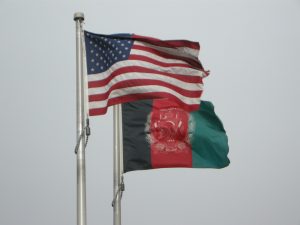The U.S. Embassy in Kabul is resuming in-person special immigrant visa interviews after suspending interviews last month amid a COVID-19 outbreak among embassy staff. The resumption of interviews also comes amid an atmosphere of fear as the Taliban make military advances across the country and the United States nears a new withdrawal deadline: August 31.
The top U.S. diplomat in the Afghan capital, Chargé d’Affaires Ross Wilson, tweeted the announcement. “I am delighted that we are resuming immigrant visa interviews this week to move the process forward for documentarily qualified applicants,” he said. “The Special Immigrant Visa (SIV) has assisted over 15,000 Afghans [to] relocate to the United States after they completed faithful service to the United States, often at great personal risk,” Wilson continued, before closing with a statement that since April the embassy has interviewed more than 1,600 people, along with their families.
The Special Immigrant Visa (SIV) program is nestled within the United States’ strict and complicated (and some would argue extremely broken) legal immigration system. As a Congressional Research Service report outlines, the term “special immigrant” was added to the Immigration and Nationality Act (INA) in 1965, building on what had been termed “nonquota immigrants.” Put simply, the category carves out a path for immigrants outside the annual quota-based and lottery selected system.
Starting in 2006, following provisions added by Congress to the Fiscal Year 2006 National Defense Authorization Act (NDAA), certain Iraqi and Afghan citizens who had worked directly with U.S. forces as translators, as well as their spouses and children, became eligible to be classified as special immigrants. The initial cap was 50 annually. From 2009 through 2012, the cap for Afghans was 1,500, with subsequent legislation raising the cap. The latest legislation, as the CRS report outlines, includes “language to authorize different numbers of additional Afghan SIVs.” The FY2021 Consolidated Appropriations Act, authorized a new total of 26,500 Afghan SIVs; the FY2021 NDAA authorized 22,620. CRS notes that the State Department is working based on the higher number.
Each phase of additional legislation that raised the cap also included additional reporting requirements, ostensibly in the interests of security. Furthermore, though the cap has risen, the capacity in the State Department to process applications has not kept pace, leading to a reportedly significant backlog, further hogtied by legislation. While the number of slots increased over the years, so did the burdens on Afghans to prove themselves eligible. The necessary documentation is difficult to provide for some Afghans, given the conditions in the country.
As numerous, wrenching accounts illustrate, it is not a simple process for an Afghan to obtain an SIV. And as the Taliban make military gains, and concerns rise of a Taliban takeover, Afghans who assisted U.S. forces fear for their lives.
In a speech last week, U.S. President Joe Biden claimed that the administration had “already dramatically accelerated the procedure time for Special Immigrant Visas to bring them to the United States.” He said since his inauguration, 2,500 SIVs had been approved, but only half had exercised their right to come to the United States.
“We’re working closely with Congress to change the authorization legislation so that we can streamline the process of approving those visas.”
In late June, the U.S. House of Representatives approved a bill, with a broadly bipartisan vote of 366 to 46, which would allow Afghans to qualify for the visa without a medical examination. In introducing the legislation in May, Representatives Jason Crow (D-CO) and Brad Wenstrup (R-OH) noted that “many have cited the medical examination requirement, which can cost thousands of dollars, as a serious delay in the process.”
The bill now must pass through the Senate. Traditionally, Congress goes into recess in the month of August and given political gridlock in Washington, it’s unclear if the bill will get a vote before the break. Other legislation is in various phases, too, which would raise the SIV cap further.
In his recent remarks, Biden said that an operation was underway to identify facilities outside the United States and Afghanistan “to host our Afghan allies.” In theory, this would remove individuals from immediate danger while their applications process. Biden said relocation flights would begin in July, for those who choose to take advantage of the option.
“But our message to those women and men is clear: There is a home for you in the United States if you so choose, and we will stand with you just as you stood with us,” Biden said.
Earlier reporting by Bloomberg suggested that the United States had approached Kazakhstan, Tajikistan, and Uzbekistan to take in around 9,000 Afghans who had worked with U.S. forces and who are working through the lengthy SIV process.
The International Rescue Committee (IRC), which has assisted in the resettlement of thousands of SIV recipients since the program’s creation, said in a recent statement that “Only 16,000 Afghan SIVs have been issued since 2014 despite the availability of 26,500 total authorized visas during that time.” Estimates suggest that it will take more than two years to process the more than 18,000 applications currently in the pipeline.
The question of whether Washington can speed up the process is primarily a legislative question, followed by one of capacity. Only legislation can loosen the rules and provide additional support to staff executing the processing, but with Congress a few weeks from its traditional August recess, there many not be time.

































